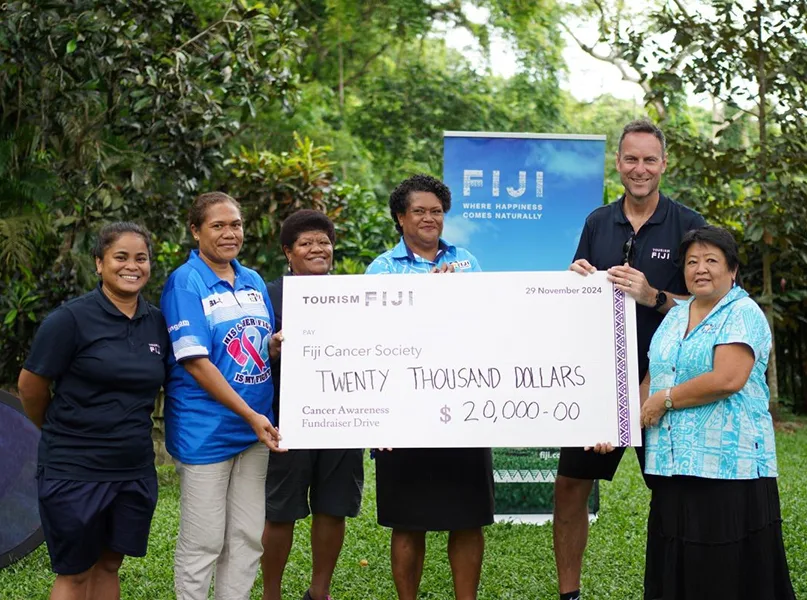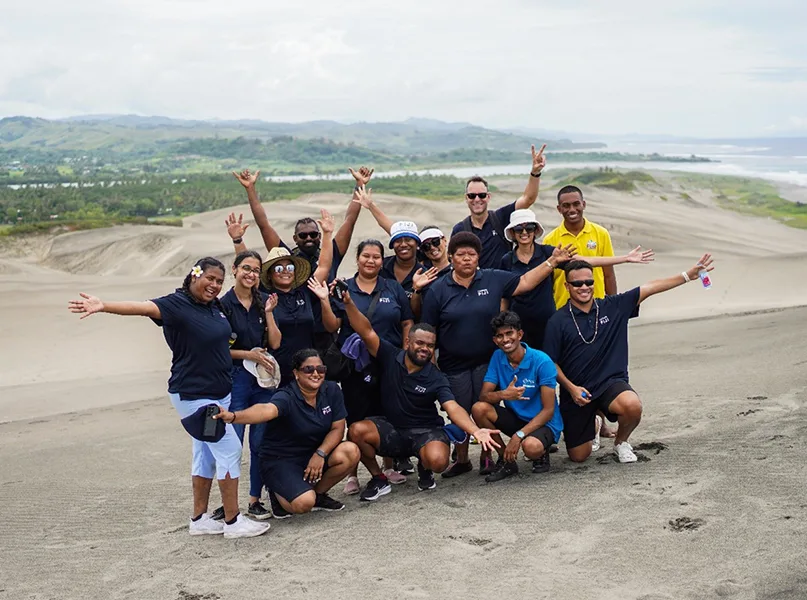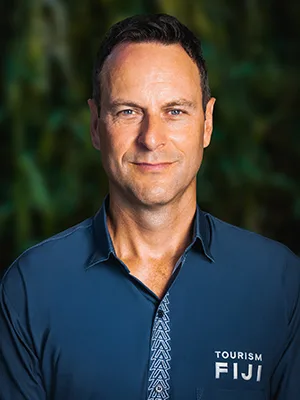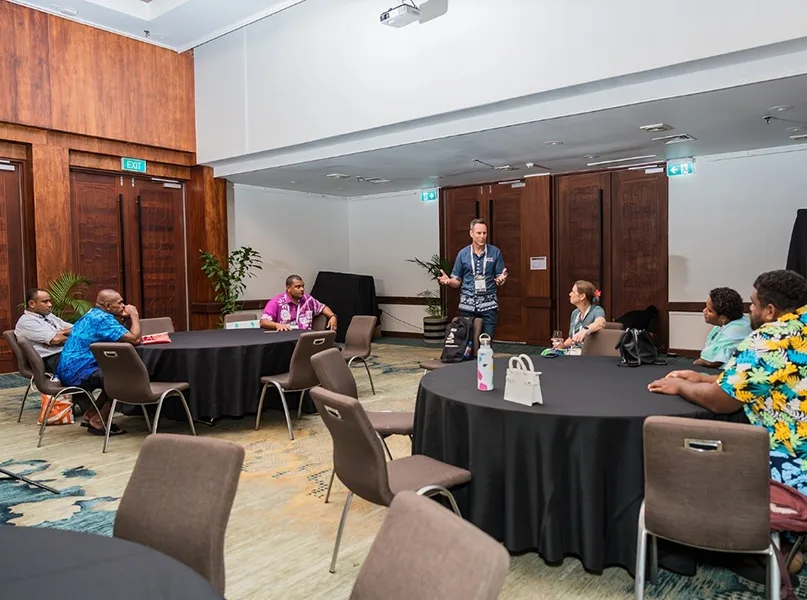Tourism Fiji focuses on showcasing the authenticity of the nation, emphasising real, meaningful experiences, and promoting the superb array of attractions and activities available. CEO, Brent Hill, takes us through the organisation’s evolution and its comprehensive promotion strategies.
Q&A WITH TOURISM FIJI
Can you describe the inception of Tourism Fiji and how it has evolved?
Brent Hill, CEO (BH): Tourism Fiji was established with a vision to position Fiji as the jewel of the South Pacific. Our goal was clear – to increase international visitor arrivals in a sustainable way for the benefit of all Fijians.
Over the years, we have built a diverse and vibrant industry offering a range of experiences to a variety of visitors, from families to solo travellers, through to adventure and luxury lovers. We’ve grown Fiji’s global profile and boosted tourism earnings, and our goals are to continue doing this whilst preserving and showcasing our unique Fijian culture, landscapes, and hospitality.
Our refreshed destination brand and tagline ‘Where Happiness Comes Naturally’ was launched in 2022 and celebrates our culture and people.
Fiji has long been recognised as one of the happiest places in the world and this has always been a part of our identity. Not just over the course of our tourism history, but throughout the broader heritage of our people. It isn’t something that is turned on for visitors – it’s how Fijians live.
Additionally, because we are a culture that in many ways, understands true happiness, we’re perfectly placed to create holiday experiences that bring genuine joy to those who visit our island home.
This, alongside the warmth and kindness of Fijians, our lush environment, and the authentic experiences that our destination offers, are key drivers of our story, and will continue to boost the growth of Fiji’s tourism industry.

Can you highlight some of the organisation’s current objectives?
BH: Our goal is to inspire travellers to choose Fiji whilst maximising the social, cultural, environmental, and economic benefits of tourism for our nation. Achieving this requires collaboration with various stakeholders, ensuring that tourism benefits both visitors and local communities.
Our goals for the next few years are as follows:
- Reach 1.25 million international visitors and FJ$4 billion in total visitor spend by 2027 – We aim to drive sustainable growth and ensure tourism continues to positively impact Fiji’s economy.
- Grow demand sustainably – By targeting high-potential markets, we aim to encourage travellers to explore more of Fiji and spend more on a range of activities and experiences.
- Strengthen Fiji’s global brand – We’ve refreshed our brand to highlight the authenticity of the island’s culture. Our brand platform, ‘Fiji – Where Happiness Comes Naturally’, shifts the perspective to focus on Fijians and the natural happiness that is part of their way of life.
- Develop responsible and sustainable tourism – We’re committed to creating tourism experiences that align with Fiji’s culture and values whilst supporting sustainable development practices.
- Raise awareness of tourism’s value – We aim to increase recognition of tourism as a key driver of economic growth and job creation across Fiji.
- Promote sustainable tourism practices – We are focused on educating and advocating for the adoption of sustainable practices within the tourism industry, supporting the National Sustainable Tourism Framework (NSTF).
- Build a high-performing team – We are committed to creating a positive and innovative work environment, developing future leaders for Fiji’s tourism sector.

What is the key to promoting Fiji during the quieter months of the year?
BH: Fiji’s tropical climate means that even during the rainy season, the weather is generally quite pleasant, with plenty of sunshine to enjoy. Even on rainy days, warm temperatures mean visitors can still enjoy swimming and other outdoor activities as the warm Fijian hospitality never fails to lift spirits. As such, the nation attracts visitors year-round because there’s always so much to do, no matter the weather.
We promote Fiji during the quieter months by working closely with our trade partners, offering special sales, and leveraging deals from Fiji Airways for discounted flights. We also strategically time any brand campaigns so they are available to prime potential visitors for low season.
Additionally, we highlight the exciting range of events that take place throughout the year, from sports activities like Fijian Drua matches to major events such as the Melbourne Storm’s visit in 2024 and this year’s hosting of the World Surf League (WSL) Finals. We also host a range of global conferences including the Asia Pacific Hotel Industry Conference & Exhibition (AHICE) Investment in Tourism Summit and the Global Sustainable Tourism Council (GSTC) sustainability conference.
Music events such as Homecoming Festival also bring an extra layer of excitement, ensuring there’s always something going on in Fiji.
By making the island a destination that offers great experiences year-round, promoting its vibrant events, and timing our campaigns strategically, we encourage travellers to include Fiji in their bucket lists, knowing they can enjoy the beauty and warmth of our island home no matter the season.
Are there any unique projects in the works that you wish to highlight?
BH: Yes, we’re excited to launch a sustainability-focused campaign this year that brings together both the tourism industry and visitors to give back to the environment. Loloma Hour is the world’s first happy hour for the environment – a unique initiative that encourages all visitors to contribute at least one hour of their stay to the preservation of Fiji’s natural beauty and unique culture.
The campaign leans into our brand tagline because we know true happiness comes not just from what you take, but what you give.
We also know travellers are increasingly looking to minimise their environmental footprint, and we believe this campaign will not only encourage this but also raise awareness about the importance of sustainability in tourism.

What trends are transforming the tourism industry in Fiji and how are you utilising them?
BH: Wellness tourism has gained immense popularity, and we’re focusing on promoting Fiji as a destination for relaxation, rejuvenation, and holistic well-being.
Sustainability is also top of mind for travellers, so we are actively developing and promoting sustainable tourism practices. Genuine, authentic travel experiences are also becoming increasingly important, so we ensure that visitors can immerse themselves in Fiji’s true culture and natural beauty.
Additionally, we’re seeing a rise in solo and intergenerational travel, and we’re tailoring our offerings to create experiences that cater for both individual travellers and families across numerous demographics.
By embracing these trends, we’re able to provide experiences that resonate with today’s travellers whilst preserving the essence of what makes Fiji special.

“Community, family, the spirit of sharing, gratitude, and inclusion are all integral to why Fiji is such a happy place”
Brent Hill, CEO, Tourism Fiji
What challenges are you currently encountering?
BH: The tourism industry in Fiji faces several challenges, primarily competition from other destinations vying for attention. Whilst Fiji offers a unique and memorable experience, we must continuously innovate and effectively market ourselves to stay competitive.
At the same time, budget constraints can limit our ability to fully capitalise on opportunities, particularly when it comes to large-scale marketing efforts and infrastructure development.
Additionally, climate change is something we can’t underestimate. As a small island nation, we are vulnerable to the effects of rising sea levels and extreme weather events, which impact both the environment and our tourism infrastructure.
We are actively working on sustainability-focused initiatives and resilience-building efforts, but climate change remains a concern that requires ongoing attention and collaboration across sectors.
Economic and sociopolitical factors globally, as well as increasing costs of travel, are also challenges for Fiji and many destinations alike.
“With ongoing investments in infrastructure and sustainable tourism practices, we’re setting the stage for continued growth and success in the industry”
Brent Hill, CEO, Tourism Fiji
How optimistic are you about the future of tourism in Fiji?
BH: There are many exciting projects in the pipeline for Fiji, including renovations and new developments that will further enhance the visitor experience. With ongoing investments in infrastructure and sustainable tourism practices, we’re setting the stage for continued growth and success in the industry.
The future looks very promising, and there’s definitely a lot to look forward to as we continue to evolve and attract more visitors to our beautiful islands.































